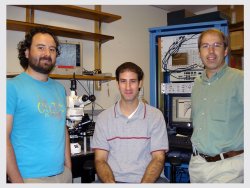Aug 28 2007
Andrea Lelli, Eric A. Stauffer and Jeffrey R. Holt, Department of Neuroscience, University of Virginia Medical School have won the $25,000 PI (Physik Instrumente) NanoInnovation Grant™ for a research proposal entitled "A Fast Mechanical Nanostimulator to Study Sensory Transduction and Amplification in the Inner Ear".
 2007 NanoInnovation Grant winners Andrea Lelli, Eric A Stauffer and Jeffrey R. Holt.
2007 NanoInnovation Grant winners Andrea Lelli, Eric A Stauffer and Jeffrey R. Holt.
Hair Cells & Mechanotransduction
Hair cells are mechano transducers located in the sensory portion of the inner ear. They transform high frequency nanometric mechanical displacements into electrical signals that are transmitted to the brain. Many aspects of hair cell function remain unknown because biophysical studies of hair cell mechanotransduction have been limited by unreliable and slow methods for stimulus delivery.
Nanostimulator Based on Fast Piezo Actuators
Lelli, Stauffer and Holt will build a nanostimulator using PI piezo actuators and a 3-Axis piezo nanopositioning stage (Nanocube) that can reliably stimulate sensory hair cells at frequencies up to 10 kHz with motions that range from a couple of nanometers to a couple microns. Problems with hearing and balance are the most common sensory deficits worldwide.
Thus, this work will provide the foundation for understanding the normal physiology and the pathophysiolgy of the inner ear which will facilitate the design of rational strategies to treat inner ear dysfunction.